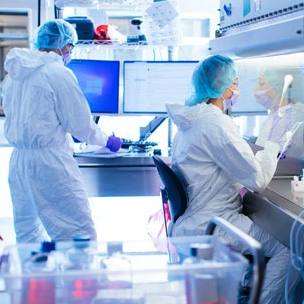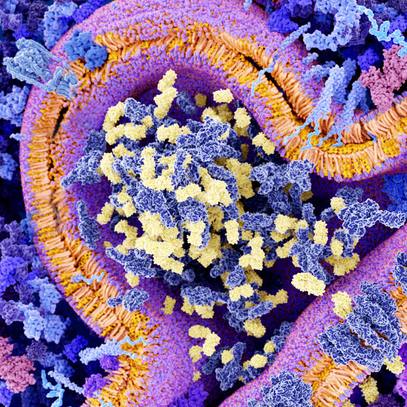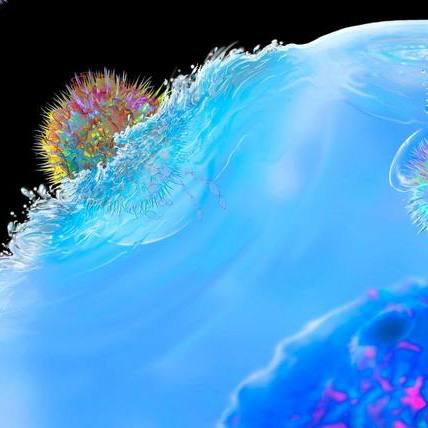-
Biotherapeutics
Science Saturday: How regenerative medicine is advancing ALS research
May is ALS Awareness Month, a time to reflect on the role of regenerative medicine research in advancing understanding and treatment of amyotrophic lateral sclerosis (ALS) or Lou Gehrig's disease. This neurodegenerative disorder causes nerve cells in the brain and spinal cord to die, blocking signals to the muscles. That results in paralysis that robs a person of the ability to walk, talk and breathe. Because there is no cure, ALS eventually leads to respiratory weakness and death.
"There's a huge urgency to find new therapies that help patients with ALS because currently what we have is not sufficient. Patients are eagerly awaiting answers that address their unmet needs. We need to quickly and safely deliver new, validated treatments to those who are afflicted. That motivates our team to get out of bed every morning and work on it as hard as we can," says Nathan Staff, M.D., Ph.D., a neurologist, regenerative medicine expert and principal investigator on ALS stem cell research at Mayo Clinic.
New options are needed, because the drugs approved by the Food and Drug Administration (FDA) to treat ALS are not effective enough at slowing the course of the disease.
Seeking regenerative medicine solutions
A transformation is underway in health care that is shifting the focus of medicine from fighting disease to rebuilding health. At the forefront is Mayo Clinic's Center for Regenerative Medicine, which supports ALS research as part of its mission to develop and deliver innovative, curative therapies for patients.
ALS affects about 15,000 people in the U.S. Approximately 5,000 new cases are diagnosed every year, according to the The ALS Association and the Centers for Disease Control and Prevention. Roughly 1 in 10 cases of ALS are the inherited type that are linked to genetic mutations. However, 90% are a sporadic type that are without an obvious cause and presumed to be due to interactions between a person's genetics and environmental exposures. People over 40, smokers and men appear to be at a higher risk for the disease.
Mayo Clinic research seeks to unravel the complexities of ALS in hopes of revealing possible new treatments. Investigators are probing whether mesenchymal stem cells derived from adipose, or fat, tissue could provide growth factors and anti-inflammatory properties to protect nerve cells from dying, thereby halting disease progression. Mesenchymal stem cells are adult stem cells that have been well-studied. Results of a phase 1 clinical trial at Mayo Clinic found mesenchymal stem cell therapy is safe and warrants further study.
"It was clear that about 30% of ALS patients in the trial stabilized after mesenchymal stem cell therapy," says Anthony Windebank, M.D., deputy director of Discovery for Mayo Clinic's Center for Regenerative Medicine and principal investigator of the phase 1 clinical trial. "We also learned that patients who had been treated with mesenchymal stem cells early in their disease had the best outcomes. Our discovery shows potential for therapeutic benefit, but more research is needed to confirm that."
Building on the phase 1 clinical trial, Mayo Clinic researchers are testing stem cell therapy in a larger group of patients for a longer period of time. The study seeks to answer whether stem cells can slow the debilitating effects of ALS, and if so, why stem cell therapy works for some but not others.
"We are trying to understand what is driving the different responses. Is it the patient's genetics? Is it the immune system? Is it possibly the cells themselves and how they're reacting to the therapeutic environment? Our current studies try to understand the different factors that cause people to respond or not respond to mesenchymal stem cell therapy," says Dr. Staff, principal investigator of the phase 2 clinical trial for ALS.
The research team is optimistic that clinical trials at Mayo and around the world will someday bring new answers and new options for patients. In parallel, the discovery of genetic mutations also has spawned gene therapy clinical trials for patients with the inherited form of the disease.
"The types of trials and the types of possible solutions that are being put forth really kind of go after the ALS process in a number of different ways. Some drugs being tested are looking at the immune system. Others are looking at cellular pathways," says Dr. Staff. "There's been a lot of different approaches with the common aim of trying to help slow down the disease."
Mayo is collaborating with industry and other academic institutions to try to speed research that would lead to new therapies in the practice. But stem cell therapy research is still in the early stages. It is uncertain how long it will take to complete advanced clinical development, a critical step toward receiving FDA approval for new therapies to be used in daily clinical care.
###









